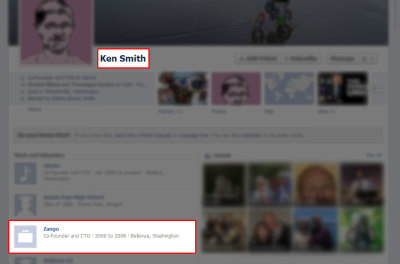Christianity Today Writer Ken Smith Is Founder of a Company Fined for Deceptive Business Practices; With Child Porn Ties

The co-author of a recent Christianity Today article is one of the founders of Zango, a company fined by the FTC for unfair and deceptive business practices, including lax distribution of software that furthered child pornography. The Christianity Today article was co-written by Ted Olsen and Ken Smith, who founded 180solutions (which later became Zango), a company with software that had been "distributed in conjunction with child pornography," according to documents obtained by The Christian Post.
An online search of Smith confirms his relationship as chief technology officer and one of the founders of Zango, a Washington state-based software company that was known for installing intrusive adware that took over a computer's browser and bombarded the user with pop-up ads.
The Christian Post looked into Smith's possible connection to pornography after readers alerted the newspaper that one of the authors of a recent Christianity Today article shared the same name as Zango founder Ken Smith. Commenters provided links about a Ken Smith that had founded 180solutions Inc. (earlier name ePIPO) around 2000, which later merged with Hotbar to form Zango Inc., a company which for a period of time had affiliates that distributed links to child porn.
The Christianity Today story by Olsen and Smith in the September issue has produced a firestorm of criticism of the publication from global Christian leaders.

Several readers of Christianity Today's article reported that comments exposing Smith's background had been deleted on the website within minutes to an hour of posting. A few commenters even re-posted on the CT article questioning why their comments were deleted. Several readers sent complaints about these occurrences to CP.
These users reported to CP that some of these comments included information about Smith's past involvement in Zango and 180solutions. Zango, the company where Smith had served as founder and chief technology officer, was fined $3 million by the Federal Trade Commission for unfair and deceptive business practices. Smith later stepped down from his post and his brother, who was the CEO of Zango, later filed for personal bankruptcy in 2009. The company shut down after a foreclosure of a bank consortium.
Other comments pointed to Smith's 180solutions, which had affiliates that distributed child pornography, according to documents obtained by The Christian Post.
A chief compliance officer of 180solutions, Ken McGraw, confirmed that the company's "180search Assistant had been distributed in conjunction with child pornography" in a September 2005 email sent to Alex Eckelberry, a writer of a technical news website:
Alex,
I'm Ken McGraw, Chief Compliance Officer for 180solutions. Thank you for letting us know about the instance you discovered where 180search Assistant had been distributed in conjunction with child pornography. With your help, we have been able to confirm this to be true and will be taking the following actions:
* Based on pressure from us, Simpel Internet has ceased all distribution operations until they can get better control of their affiliates.
* We will cooperate with law enforcement in any way we can to ensure that justice is brought in this case.
* In the next couple of days, once we have the name and contact information of the alleged child pornographer, we will file a civil lawsuit. All proceeds from this suit will be donated to a charity or organization whose mission is to protect children from online pornography or predation.
It goes without saying that child pornography is illegal and morally reprehensible. Fortunately, this is the first time in our six years of existence, to my knowledge, that we have been distributed with this type of illegal content. We deplore it. Distributing our products with such illegal content is specifically against our code of conduct and as such, we will continue to do everything we can to prevent our products from being distributed with it.
Sincerely,
Ken McGraw
Chief Compliance Officer
180solutions, Inc.
Several months after McGraw's email, Smith's 180solutions merged with the company Hotbar and formed Zango, where Smith's official title was chief technology officer. But the practices relating to pornography continued.
A month after the merger, Smith's company made the news again, this time for adult pornography being distributed to children, according to media reports. In July 2006, The Washington Post reported that Warner Bros. Studios was looking to end its business relationship with Zango after the adware company was found to be offering free games to kids on the Warner Bros. website in exchange for permission to install a program that could advertise pornography.
Warner Bros. Studios, which is home to Bugs Bunny, Scooby Doo and Harry Potter, ran a web page called "Fun Stuff' where the free games by Zango were being offered, according to the Post, which notes the audience appeared to be children.
The Washington Post reported users who clicked on the game were directed to a page asking for permission to install on the computer a program whose terms of agreement includes a disclosure that users may receive adult-oriented ads through it.
In response to news that Warner Bros. was looking to sever ties with Zango, a Zango spokesman characterized the promotion of its software on a child-oriented site as a case of "ad inventory mix-up," according to the Washington Post. He added that it was not Zango's job to "police the Warner Bros. site."
Following the incident with Warner Bros., a public advocacy group filed a complaint against Zango with the Federal Trade Commission for engaging in unfair and deceptive business practices. As a result of the investigation by the FTC, Zango was forced to pay a fine of $3 million.
Eckleberry covered news on Zango's controversial practices for several years. In a February 2008 article, the tech writer claimed his research found that an overwhelming majority of Zango's business was derived from pornography ads.
"Zango has a real problem. By our own research, 80% of its business comes from seekmo, the porn side of its business," he wrote. Zango's annual revenue was estimated at $78 million. (The Christian Post was not able to independently verify those figures.)
Smith left Zango around 2008, and when the company shut down in 2009, the founder reflected about "What Zango Got Wrong," in a post on his personal blog. One of the reasons he offered on Zango's troubles was: "Zango screwed up its distribution."
"Back in 2003-2005, we partnered with some people that we should never have partnered with. We almost completely outsourced our distribution to them, and we let them promote and install our software without adequate oversight or supervision," wrote Smith.
After reports alleging 180solutions' link to child pornography and Zango's link to pornography, Smith made no specific references to those matters on his blog. In 2007, Smith said his tech department of 90 people was doing "pretty well."
None of Smith's personal blog posts mentioned child pornography or pornography.
The Christian Post has made repeated efforts to discuss Smith's article and his background before Christianity Today published its story. Smith contacted The Christian Post first, requesting an interview with the CP's CEO.
When this reporter returned the phone call to Smith, he sounded surprised to hear that this reporter actually wanted to interview him regarding the claims that he made on his blog about Christian organizations as well as his faith background. Smith agreed to an interview scheduled for the next day.
Within an hour of the call with Smith, Ted Olsen, managing editor of News & Online Journalism at Christianity Today, sent this reporter an email saying he was working on the story with Smith and would also join the phone interview the next day.
Two hours before the scheduled interview time the next day, Smith canceled.
This reporter sent two emails to Olsen over the next few days, one expressing disappointment that Smith canceled the interview with CP, and the second requesting Olsen to explain his reasons for hiring Smith. Both of the emails went unanswered.





















